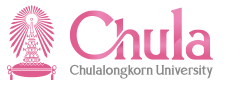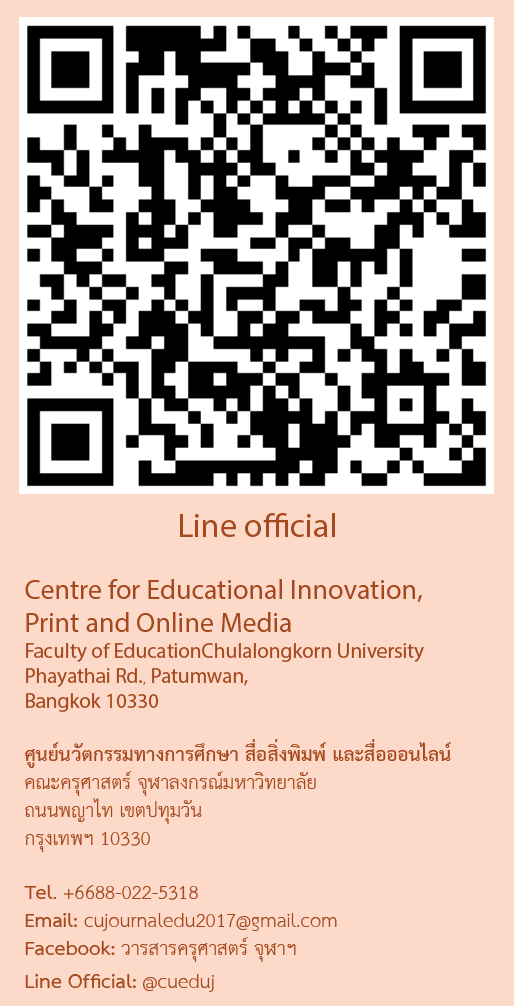Article Title
Development of Exercise Program Using Sensory Integration Theory with Thai Wisdom to Improve Health–Related Physical Fitness and Social Skills of Autistic Children(การพัฒนาโปรแกรมการออกกำลังกายโดยใช้ทฤษฎีบูรณาการประสาทความรู้สึกร่วมกับภูมิปัญญาไทยเพื่อพัฒนาสมรรถภาพทางกายที่สัมพันธ์กับสุขภาพและทักษะทางสังคมของเด็กออทิสติก)
Abstract
The purposes of this research were 1) to develop an exercise program using sensoryintegration theory with Thai wisdom to improve health-related physical fitness and social skills of autistic children, and 2) to evaluate the effectiveness of an exercise program using sensory integration theory with Thai wisdom to improve health-related physical fitness and social skills of autistic children. The subjects of this study were 8 children of 12?18 years old who were diagnosed with autism at a moderate level. Those autistic children were purposively selected. The subjects were trained in 45 minute sessions, 3 times a week for 8 weeks. Data were collected before the experiment, immediately after the experiment and again after 2 weeks, and were analyzed by descriptive statistic, one-way ANOVA with repeated measures and t-test. The research results findings were as follows:1) The develop program consisted of 3 intervention activities: Thai traditional play using a loincloth, individual exercise, dual exercise, and group exercise. There were 26 exercise posts and 5 steps in the exercise. The program had an aggregate IOC of 0.94. 2) The health-related physical fitness of autistic children after the experiment and in the following 2 weeks was higher than before the experiment at a 0.5 level of significance. 3) Skills in social interaction, social communication and working with others compared to after the experiment was higher than before the experiment at a 0.5 level of significanc.(การวิจัยในครั้งนี้มีวัตถุประสงค์เพื่อ (1) พัฒนาโปรแกรมการออกกำลังกายโดยใช้ทฤษฎีบูรณาการประสาทความรู้สึกร่วมกับภูมิปัญญาไทยเพื่อพัฒนาสมรรถภาพทางกายที่สัมพันธ์กับสุขภาพและทักษะทางสังคมของเด็กออทิสติก และ (2) ประเมินประสิทธิภาพของโปรแกรมการออกกำลังกายโดยใช้ทฤษฎีบูรณาการประสาทความรู้สึกร่วมกับภูมิปัญญาไทยเพื่อพัฒนาสมรรถภาพทางกายที่สัมพันธ์กับสุขภาพและทักษะทางสังคมของเด็กออทิสติก กลุ่มตัวอย่าง คือ เด็กออทิสติกที่ได้รับการวินิจฉัยจากแพทย์ว่ามีภาวะออทิสซึ่มอยู่ในระดับปานกลาง อายุ 12?18 ปี จำนวน 8 คน จากการเลือกแบบเฉพาะเจาะจงดำเนินการทดลอง 8 สัปดาห์ ๆ ละ 3 ครั้ง ครั้ง ๆ 45 นาที ทำการเก็บรวบรวมข้อมูลก่อนการทดลอง หลังการทดลอง และหลังเสร็จสิ้นการทดลอง 2 สัปดาห์ นำผลที่ได้มาวิเคราะห์ข้อมูลโดยใช้สถิติเชิงบรรยาย การทดสอบความแปรปรวนทางเดียวชนิดวัดซ้ำ Repeated One-way ANOVA Measurement การทดสอบค่าที ผลการวิจัยพบว่า 1) โปรแกรมที่ได้พัฒนาขึ้น ประกอบด้วย 3 กิจกรรม คือ กิจกรรมการละเล่นพื้นบ้านไทยโดยใช้ผ้าขาวม้า การออกกำลังกายแบบเดี่ยว การออกกำลังกายแบบเป็นคู่และการออกกำลังกายแบบเป็นกลุ่ม จำนวน 26 ท่า และ 5 ขั้นตอนการออกกำลังกาย โดยมีดัชนีความสอดคล้อง 0.94 2) สมรรถภาพทางกายที่สัมพันธ์กับสุขภาพของเด็กออทิสติกหลังการทดลองและหลังเสร็จสิ้นการทดลอง 2 สัปดาห์สูงกว่าก่อนการทดลองอย่างมีนัยสำคัญทางสถิติที่ระดับ .05 3) ด้านทักษะทางสังคมของเด็กออทิสติกหลังการทดลองสูงกว่าก่อนการทดลองอย่างมีนัยสำคัญทางสถิติที่ระดับ .05 ทั้งในด้านปฏิสัมพันธ์ทางสังคม ด้านการสื่อสารทางสังคมและด้านการทำงานร่วมกับบุคคลอื่น)


